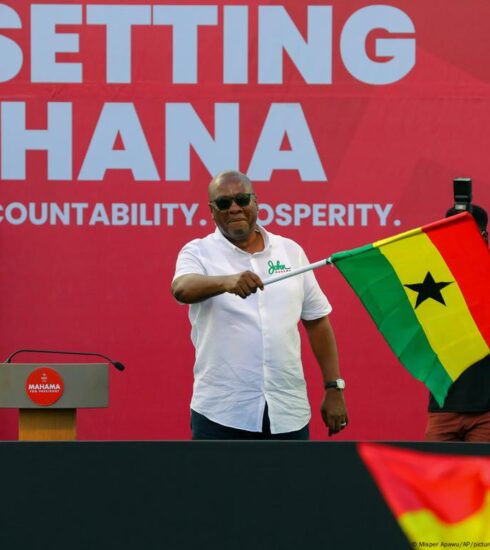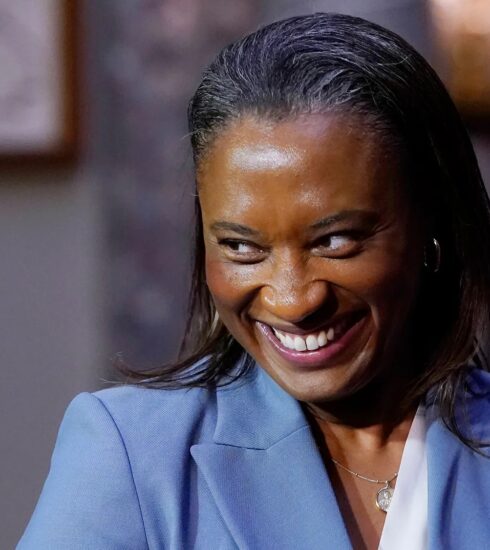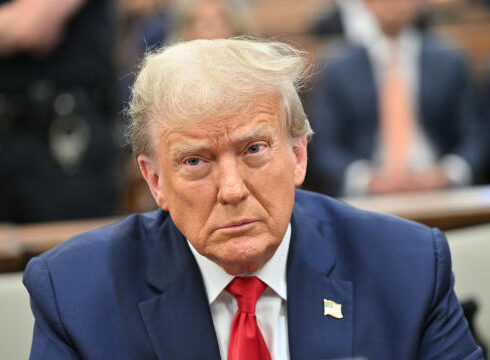BRICS have emerged as a formidable alliance of emerging-market economies over the course of the 21st century. Brazil, Russia, India, China, and South Africa make up this alliance as their acronym alludes to and the group has increasingly become the bricks and mortar which supports the global economy.
Just this year, BRICS overtook the G7’s global GDP contribution, with the group accounting for almost one-third of worldwide economic activity. Amid growing economic stagnation in the West, the BRICS even floated the idea of their own global reserve currency, looking to shatter the stranglehold the US Dollar has had since the collapse of Bretton Woods in 1971.
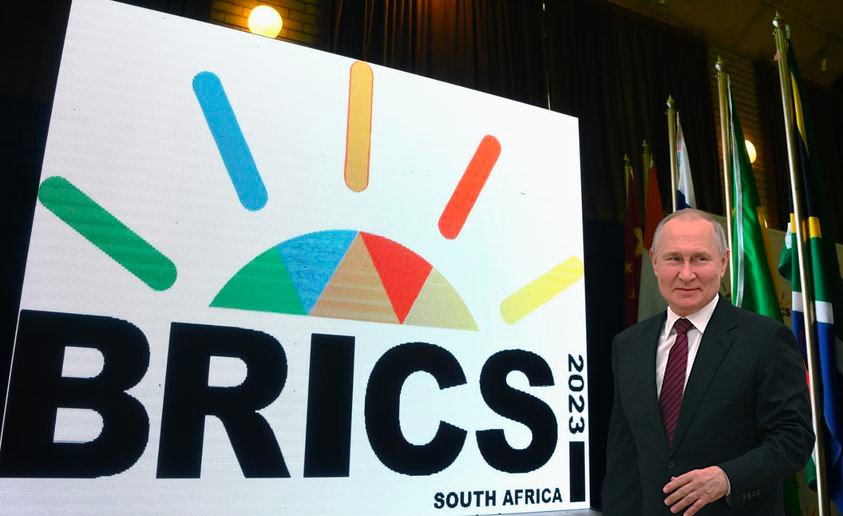
Russian President Vladimir Putin. Photo -BRICS website
However, BRICS’s diverse economic and political systems, as well as mounting geo-political tensions with Russia and China, have threatened the group’s progress. As the debate grows around whether Putin will even attend the upcoming conference in South Africa slated for later this month, it has left many observers wondering whether the project is starting to run out of steam or just getting started.
One of the major aims of BRICS is to use cooperation to reshape the global political and economic architecture to their benefit. The BRICS Parliamentarian Forum and Outreach Dialogue serve as avenues for consultations and engagement with regional neighbors and other interested countries. For example, South Africa utilizes the BRICS platform to pursue its foreign policy priorities, such as the African Agenda and South-South Cooperation.
Economic relationships between members have been formalized by the creation of the BRICS Business Council, the Contingent Reserve Agreement, and the New Development Bank (NDB). The NDB, headquartered in Shanghai, plays a significant role in mobilizing resources for infrastructure and sustainable development projects within BRICS nations. The CRA provides short-term liquidity support to member countries, enhancing financial stability and mitigating balance-of-payment crises.
The upcoming BRICS Summit agenda is expected to cover trade and investment facilitation, sustainable development, innovation, and global governance reform. However, one of the key points in this 15th BRICS summit will be a discussion of the BRICS’s controversial proposition of a new, gold-backed currency.
This policy reflects the BRICS’s desire to reduce reliance on the U.S. dollar, although many question the motivations behind it. Some suggest that the move is designed to cement the BRICS’s place at the head of the global economy, while others think that it is designed as a reactive measure to economic problems within the group. Either way, it is likely that a perceived weakness of the US both economically and diplomatically has BRICS members contributed to the timing of the announcement.
The de-dollarisation momentum has been building for a while now, with Russia, China, and Brazil increasingly using non-dollar currencies in cross-border transactions. The Russian invasion of Ukraine and subsequent Western sanctions have further motivated these efforts. The BRICS nations have also explored the possibility of a BRICS cryptocurrency and strategic alignment of Central Bank Digital Currencies for currency interoperability and economic integration.
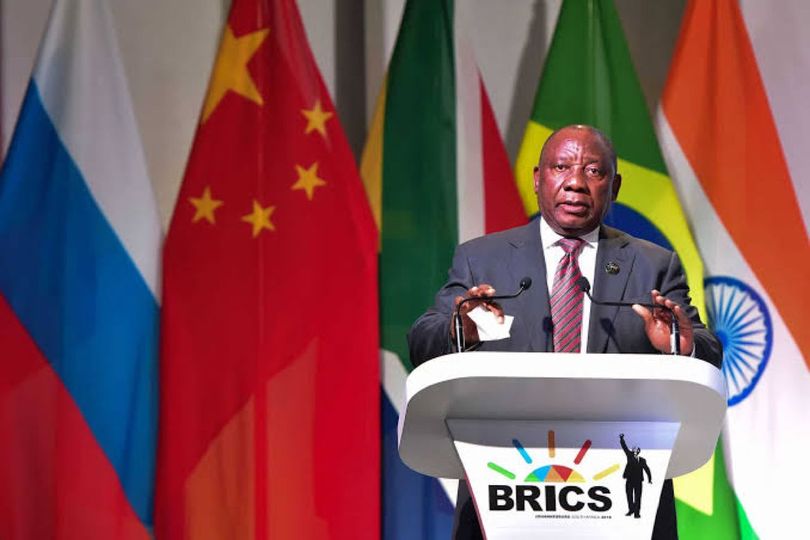
President Cyril Ramaphosa, as Chair of BRICS for 2023, will host BRICS leaders at the 15th BRICS Summit at the Sandton Convention Centre (SCC) in Johannesburg, Gauteng, from 22 – 24 August 2023. Photo Credit- BRICS (Facebook)
A new BRICS currency would require extensive negotiation and the establishment of mechanisms for exchange rates, payment systems, and financial market regulation. However, the group’s focus may initially be on developing an efficient integrated payment system for cross-border transactions before introducing a new currency.
Russian President, Vladimir Putin, will not be present at the upcoming summit in South Africa, as announced by the South African government. This decision came after the leader of South Africa declared that any attempt to arrest Putin would be considered an act of war against Russia. If Putin had left Russia, he would have been subject to an International Criminal Court (ICC) arrest warrant, as South Africa is an ICC signatory and expected to cooperate.
However, the absence of Putin was described as a mutual agreement following consultations between the two countries. Instead of attending in person, Russia’s Foreign Minister, Sergei Lavrov, will represent the country at the summit. Putin will still participate in the BRICS Summit 2023 through a video link. The invitation to Putin sparked national and international controversy, given the accusations of war crimes in Ukraine and concerns about South Africa’s position in the Russia-Ukraine conflict.
Various groups, including the Democratic Alliance and Amnesty International, pushed for Putin’s arrest if he visited the country. President Cyril Ramaphosa opposed such a move, citing national security concerns and Russia’s warning that arresting its president would be considered a declaration of war.
Russia has consistently dismissed the ICC arrest warrant, asserting that it is not a member of the organization. Africa remains divided over the Russia-Ukraine conflict, with some nations hesitant to support UN resolutions condemning Russia’s actions due to economic ties with Moscow.
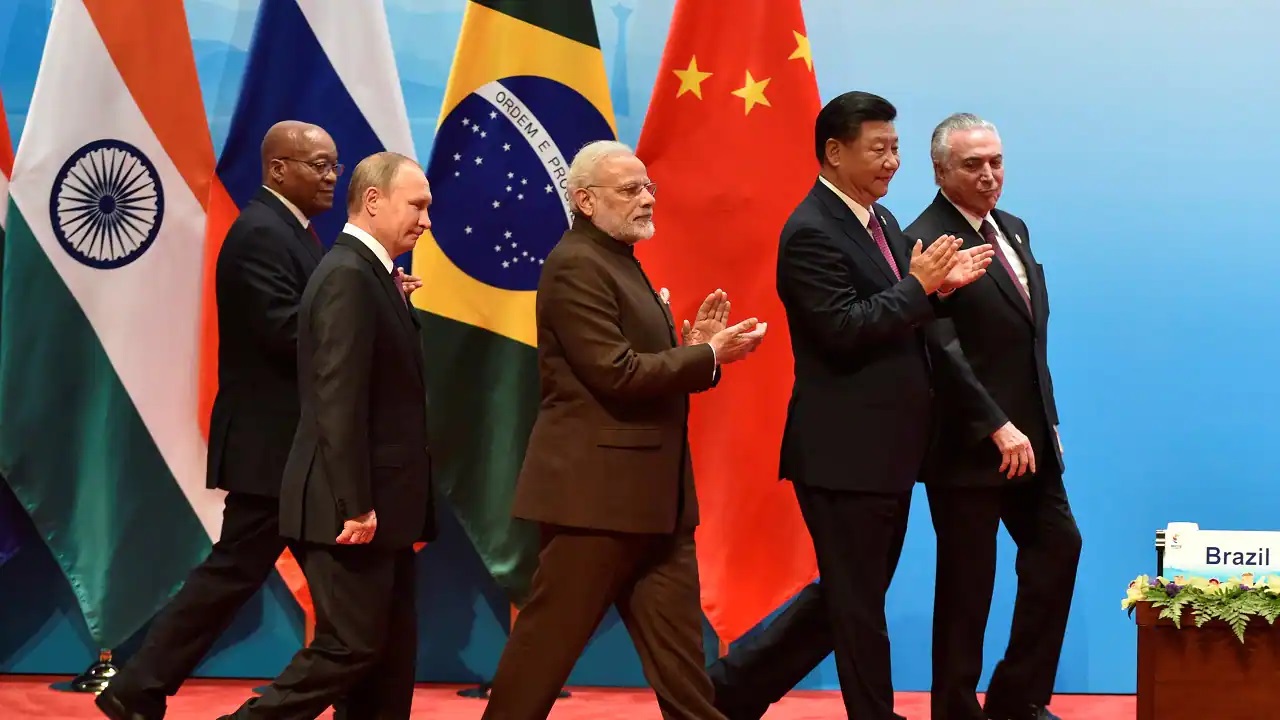
The leaders of Brazil, Russia, India,China and South Africa say they are resolute in their determination to usurp the U.S. dollar for international transactions. Photo- S.A. Trust
These circumstances surrounding Putin’s attendance have cast a shadow over the BRICS summit and have implications for the group’s unity and cooperation. Factor this with domestic political problems in Brazil and economic troubles in China and one can see why this year’s summit is so important. Get it right and the member states can take fiscal and political control of their future. Get it wrong the organization could collapse in on itself.
The outcome of the South Africa summit will be closely watched as it will shape the future trajectory of the alliance and its role in addressing geopolitical challenges. It remains to be seen how the BRICS countries will navigate the complexities of the Ukraine war and maintain unity within the group.
While challenges exist, the upcoming summit in South Africa provides an important platform to address these issues, strengthen cooperation, and shape the future direction of the group. The BRICS nations’ discussions about a joint currency reflect their aspirations to diversify away from the dominance of the U.S. dollar, even if the motivations behind this are unclear. While a new currency faces hurdles, it symbolizes the group’s commitment to being the future of the world economy. The BRICS alliance has the potential to play a pivotal role in shaping a new global economic order through its collaborative efforts and shared vision. Time will tell whether or not this vision will translate into reality.




